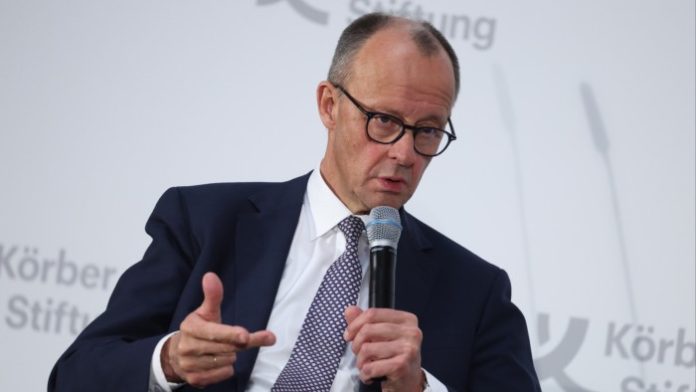Unlock the Editor’s Digest for free
Roula Khalaf, Editor of the FT, selects her favourite stories in this weekly newsletter.
The frontrunner to become Germany’s chancellor has warned companies about the “great risk” of investing in China, saying the state under his leadership would not help them if such bets failed.
Friedrich Merz, whose Christian Democratic party is leading in the polls ahead of elections next month, described China on Thursday as part of an “axis of autocracies” that did not abide by “western rule of law standards”.
“I say to all representatives of the German economy that the decision to invest in China is a decision involving great risk,” Merz said after a policy speech in which he advocated for Berlin to take a more active role on the global stage.
“My heartfelt request to all companies . . . Limit the risk you take in order to avoid endangering your own company if it triggers an immediate write-off,” he added.
German companies such as Volkswagen and BASF, as well as smaller Mittelstand groups, rely heavily on China as an export market and a manufacturing base.
German direct investment into the country rose sharply last year despite warnings from Social Democratic Chancellor Olaf Scholz about growing concerns over the Chinese market.
As a result, German companies are exposed to potential geopolitical tensions between Beijing and the west, which have become a more pressing concern after Donald Trump re-entered the White House this week. On Tuesday, the US president said he intends to impose a 10 per cent tariff on Chinese imports from February 1.
“You must expect major disruptions if you take this risk. I’ve talked to a whole range of small- and medium-sized and also very large companies,” Merz said.
“If you take this risk and if you have to write off these investments from one year to the next, then please do not, under any circumstances, come to the state . . . for help,” he added.
Merz said that if he were elected chancellor, Germany would re-engage with EU partners including France and Poland and establish a “pragmatic” and “un-romanticised” relationship with the US.
“I have been advocating that we do our own homework here in Europe in view of Donald Trump’s return to office, rather than sitting like a rabbit in front of a snake,” Merz said.
“If we want to be taken seriously as equals, we as Europeans must put ourselves in a position to take responsibility for our own security,” he added.
He said that such a strategy would involve adopting an EU-wide approach to boost military capabilities through weapons standardisation and economies of scale.
Asked about Trump’s demand that Nato increase its defence spending requirement to 5 per cent of GDP from 2 per cent, Merz said Germany would aim under his leadership to spend “more than 2 per cent”.
However, he added that EU members also needed to become more efficient and “get more for our money”.
Scholz’s coalition collapsed in November, largely due to concerns over funding for Germany’s huge defence investment needs alongside its support for Ukraine.
Germany is financially constrained by a constitutional debt brake that limits the federal state’s borrowing.
The dispute triggered early general elections, which are due to be held on February 23. Polls suggest that Merz’s CDU party will win with about 30 per cent of the vote, ahead of the far-right Alternative for Germany, which is polling at about 20 per cent.
Merz, 69, has vowed to end the “bickering” he said had come to represent Scholz’s coalition government by creating a National Security Council in the Chancellery to oversee foreign policy and security.
“Ukraine must win the war” against Russia, Merz said, but “Germany must not become a party to the war”. He added that Berlin therefore needed to continue to support Kyiv financially and militarily.
“We are facing nothing more and nothing less than a revanchist, anti-liberal axis of states that is openly seeking to compete with liberal democracies,” Merz said.




